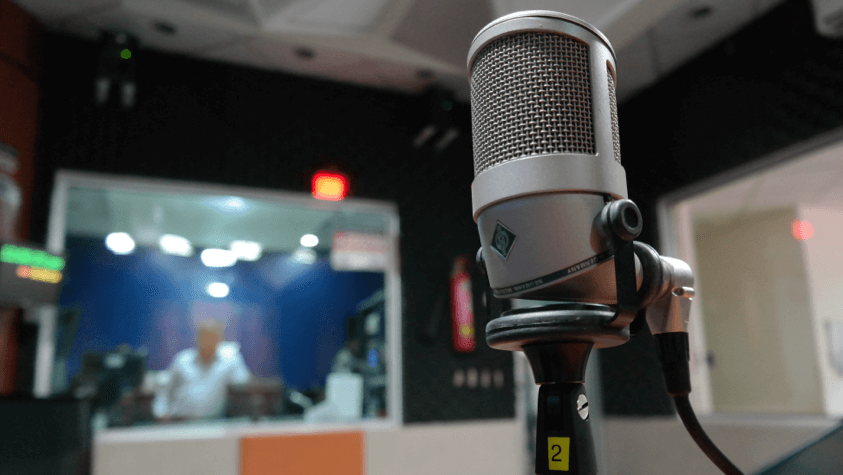By TACP Staff on July 27, 2021

Voice-over work is considered to be any vocal contribution made to a production in which the speaker is not seen. For example, animated films employ voiceover talent, as do radio and television commercials; radio stations for on-air personalities; documentaries; books on tape and audible educational materials, just to name a few.
Admit it – you hear voices everywhere. On your morning commute to work, at night when you’re watching the evening news, and possibly even late at night when you can’t sleep.
No, not the ones in your head. We’re talking about the ones supplied by voice-over artists.
Voice over is a type of off-stage or off-camera dialogue. Although the intended audience can hear this dialogue, the individual doing the voice over is usually not seen in a production. Voice-over artists are often called upon to read scripts that provide information that cannot be deduced from the main action in a production. It can then be played “over” – or during – a visual media production or during a radio broadcast.
This type of “voice art” is often used as a way to provide information during commercials and infomercials. It can also be used to add to the plot and storyline during productions, such as plays, television shows, movies, documentaries, and sports broadcasts. Radio commenters and dee-jays can also be considered voice over artists.
The main responsibility of a voice-over artist is to, in most cases, read a script and speak. That’s it. Sound simple? Think again.
First and foremost, a voice-over artist must have a good voice. However, they should also be able to read and speak well. Usually, this means that they need to read whatever script that’s put in front of them with the right attitude and tone. In general, these artists must be able to convey the right type of message, with real feeling and emotion in order to make it believable.
Depending on the project, a voice-over artist might be called upon to read scripts several different ways. A voice-over artists working on a television commercial, for instance, might be asked to sound genuinely excited and cheerful about a product or service. A voice-over artist working on a public service message, on the other hand, may be asked to convey a message in such a way that it creates an emotional impact on its listeners.
Talented voice-over artists may be able to read a script a handful of times before his clients are completely satisfied. There are times, however, when a voice-over job may require a voice-over artist to read through a script several times before the clients are truly satisfied. This is not always the artist’s fault, though. Sometimes, a message might be read a few different ways, such as with different words emphasized each time or pauses in different places, each time until it’s perfect.
Although it may seem like an easy job, it does require hard work, talent, and dedication for a successful voice-over career.
A good voice is obviously one of the most important things to consider when a voice-over career is your voice. In order to start this type of career, your voice should obviously be one of your best assets. You should also be able to speak and read well, even eloquently.
However, without the proper education or training, a good voice is basically useless when trying to start a voice-over career. Many professional voice-over artists recommend taking voice lessons, for instance. You can also choose to take some acting courses or even get an acting degree, since a large part of voice-over work is essentially acting work.
Determining the average salary for a voice-over artist can be difficult, but generally, more experienced and talented voice-over artists will be able to make higher wages. Usually, voice-over artists are paid per job. They can make anywhere from $20 to a couple of hundred dollars for just an hour of work. According to the Bureau of Labor Statistics, though, radio and television announcers made an average salary of $33,220 in 2018 and actors made roughly $17.50 per hour.
Getting voice-over jobs is a little more difficult than actually doing them. Because of the steep competition, you’ll be faced with and the tendencies of clients to use a handful of experienced voice actors, finding a voice-over job is often no walk in the park. To get started, you’ll first need to have a demo CD made. It is often best to record these demos on professional recording equipment with the help of professionals in the voice-over industry. Some reputable agents, for instance, might be able to help you create voice-over demo. Agents can also help you land voice-over auditions and gigs as well. Connecting with recording studios might be another option. Some of these studios allow aspiring voice-over artists to record their voices, which are kept on file. Potential clients can then listen to different voice-over artists and choose the one that suits their needs. These clients might work for television studios, movie studios, radio stations, advertising agencies, and theaters.
Consider these related careers in Music and Sound.

The Art Career Project is a trusted resource for emerging and professional artists.